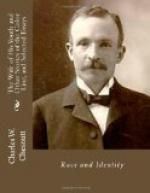The arguments followed. The prosecuting attorney briefly summed up the evidence, and characterized it as almost a mathematical proof of the prisoner’s guilt. He reserved his eloquence for the closing argument.
The defendant’s attorney had a headache, and secretly believed his client guilty. His address sounded more like an appeal for mercy than a demand for justice. Then the State’s attorney delivered the maiden argument of his office, the speech that made his reputation as an orator, and opened up to him a successful political career.
The judge’s charge to the jury was a plain, simple statement of the law as applied to circumstantial evidence, and the mere statement of the law foreshadowed the verdict.
The eyes of the prisoner were glued to the jury-box, and he looked more and more like a hunted animal. In the rear of the crowd of blacks who filled the back part of the room, partly concealed by the projecting angle of the fireplace, stood Tom, the blacksmith’s assistant. If the face is the mirror of the soul, then this man’s soul, taken off its guard in this moment of excitement, was full of lust and envy and all evil passions.
The jury filed out of their box, and into the jury room behind the judge’s stand. There was a moment of relaxation in the court room. The lawyers fell into conversation across the table. The judge beckoned to Colonel Thornton, who stepped forward, and they conversed together a few moments. The prisoner was all eyes and ears in this moment of waiting, and from an involuntary gesture on the part of the judge he divined that they were speaking of him. It is a pity he could not hear what was said.
“How do you feel about the case, Colonel?” asked the judge.
“Let him off easy,” replied Colonel Thornton. “He ’s the best blacksmith in the county.”
The business of the court seemed to have halted by tacit consent, in anticipation of a quick verdict. The suspense did not last long. Scarcely ten minutes had elapsed when there was a rap on the door, the officer opened it, and the jury came out.
The prisoner, his soul in his eyes, sought their faces, but met no reassuring glance; they were all looking away from him.
“Gentlemen of the jury, have you agreed upon a verdict?”
“We have,” responded the foreman. The clerk of the court stepped forward and took the fateful slip from the foreman’s hand.
The clerk read the verdict: “We, the jury impaneled and sworn to try the issues in this cause, do find the prisoner guilty as charged in the indictment.”
There was a moment of breathless silence. Then a wild burst of grief from the prisoner’s wife, to which his two children, not understanding it all, but vaguely conscious of some calamity, added their voices in two long, discordant wails, which would have been ludicrous had they not been heartrending.




